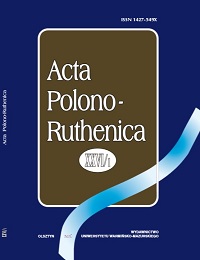Рассказ Весна в Фиальте в игровой поэтике В.В. Набокова: некоторые аспекты интерпретации заглавия
The Story Spring in Fialta in the Game Poetics of V.V. Nabokov: Selected Aspects of the Interpretation of the Title
Author(s): Gayane Yurikovna MaltsevaSubject(s): Language and Literature Studies, Studies of Literature, Russian Literature, Philology
Published by: Wydawnictwo Uniwersytetu Warmińsko-Mazurskiego w Olsztynie
Keywords: title; game poetics; game function; assotiation; V.V. Nabokov
Summary/Abstract: The article examines the features of the title of the story Spring in Fialtaby V.V. Nabokov through the prism of game poetics. The title is defined as a strong text position, a sign that gives not only pre- but also post-understanding of the text by the reader. It is proved that in Spring in Fialta the title is the key to decoding the game poetics of the work. Phonetic, lexical, and semantic components of the title are involved in the construction of a certain associative chain that makes it possible to unravel the author’s idea. Nabokov’s toponym Fialta, considered in a spatial way, is analyzed separately in the article. The title units form an associative network that unfolds in the text: spring-youth-love-happiness-Par-adise. The Central element of the analysis of the title in the game poetics of the story is the comparison of associative series associated with the images of Nina and violets. Violet in Spring in Fialta – is a metaphorical image of Nina confirmed by the postscriptum of the story. The structure of the title is characterized as cumulative, which implies accumula-tion, stringing of elements, emories, images. For example, the playful poetics Manifests itself through a peculiar geometric shape, where a circle each circle contains a circle of smaller diameter, and in the center of this text space forms the image of Nina. The title in the game poetics of V.V. Nabokov’s works is considered as an architectural design: the reader needs to unravel the relationship of its components (sounds, words, and meanings). Created by purely linguistic means, a kind of universal header construction is the key to decoding the text by the reader.
Journal: Acta Polono-Ruthenica
- Issue Year: 1/2021
- Issue No: XXVI
- Page Range: 55-64
- Page Count: 10
- Language: Russian

